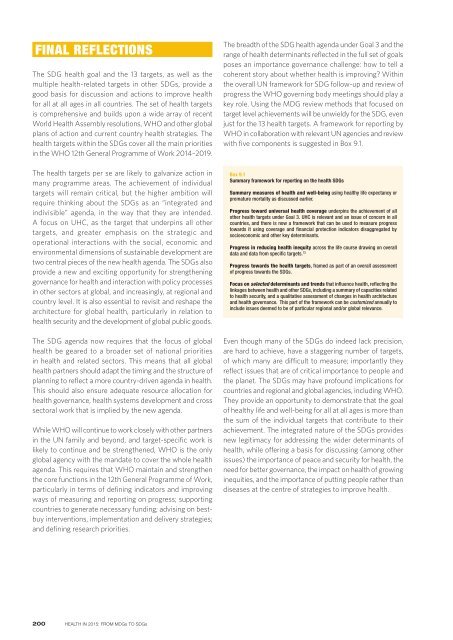You also want an ePaper? Increase the reach of your titles
YUMPU automatically turns print PDFs into web optimized ePapers that Google loves.
FINAL REFLECTIONS<br />
The SDG health goal and the 13 targets, as well as the<br />
multiple health-related targets in other SDGs, provide a<br />
good basis for discussion and actions <strong>to</strong> improve health<br />
for all at all ages in all countries. The set of health targets<br />
is comprehensive and builds upon a wide array of recent<br />
World Health Assembly resolutions, WHO and other global<br />
plans of action and current country health strategies. The<br />
health targets within the SDGs cover all the main priorities<br />
in the WHO 12th General Programme of Work 2014–2019.<br />
The health targets per se are likely <strong>to</strong> galvanize action in<br />
many programme areas. The achievement of individual<br />
targets will remain critical, but the higher ambition will<br />
require thinking about the SDGs as an “integrated and<br />
indivisible” agenda, in the way that they are intended.<br />
A focus on UHC, as the target that underpins all other<br />
targets, and greater emphasis on the strategic and<br />
operational interactions with the social, economic and<br />
environmental dimensions of sustainable development are<br />
two central pieces of the new health agenda. The SDGs also<br />
provide a new and exciting opportunity for strengthening<br />
governance for health and interaction with policy processes<br />
in other sec<strong>to</strong>rs at global, and increasingly, at regional and<br />
country level. It is also essential <strong>to</strong> revisit and reshape the<br />
architecture for global health, particularly in relation <strong>to</strong><br />
health security and the development of global public goods.<br />
The SDG agenda now requires that the focus of global<br />
health be geared <strong>to</strong> a broader set of national priorities<br />
in health and related sec<strong>to</strong>rs. This means that all global<br />
health partners should adapt the timing and the structure of<br />
planning <strong>to</strong> reflect a more country-driven agenda in health.<br />
This should also ensure adequate resource allocation for<br />
health governance, health systems development and cross<br />
sec<strong>to</strong>ral work that is implied by the new agenda.<br />
While WHO will continue <strong>to</strong> work closely with other partners<br />
in the UN family and beyond, and target-specific work is<br />
likely <strong>to</strong> continue and be strengthened, WHO is the only<br />
global agency with the mandate <strong>to</strong> cover the whole health<br />
agenda. This requires that WHO maintain and strengthen<br />
the core functions in the 12th General Programme of Work,<br />
particularly in terms of defining indica<strong>to</strong>rs and improving<br />
ways of measuring and reporting on progress; supporting<br />
countries <strong>to</strong> generate necessary funding; advising on bestbuy<br />
interventions, implementation and delivery strategies;<br />
and defining research priorities.<br />
The breadth of the SDG health agenda under Goal 3 and the<br />
range of health determinants reflected in the full set of goals<br />
poses an importance governance challenge: how <strong>to</strong> tell a<br />
coherent s<strong>to</strong>ry about whether health is improving? Within<br />
the overall UN framework for SDG follow-up and review of<br />
progress the WHO governing body meetings should play a<br />
key role. Using the MDG review methods that focused on<br />
target level achievements will be unwieldy for the SDG, even<br />
just for the 13 health targets. A framework for reporting by<br />
WHO in collaboration with relevant UN agencies and review<br />
with five components is suggested in Box 9.1.<br />
Box 9.1<br />
Summary framework for reporting on the health SDGs<br />
Summary measures of health and well-being using healthy life expectancy or<br />
premature mortality as discussed earlier.<br />
Progress <strong>to</strong>ward universal health coverage underpins the achievement of all<br />
other health targets under Goal 3. UHC is relevant and an issue of concern in all<br />
countries, and there is now a framework that can be used <strong>to</strong> measure progress<br />
<strong>to</strong>wards it using coverage and financial protection indica<strong>to</strong>rs disaggregated by<br />
socioeconomic and other key determinants.<br />
Progress in reducing health inequity across the life course drawing on overall<br />
data and data <strong>from</strong> specific targets. 12<br />
Progress <strong>to</strong>wards the health targets, framed as part of an overall assessment<br />
of progress <strong>to</strong>wards the SDGs.<br />
Focus on selected determinants and trends that influence health, reflecting the<br />
linkages between health and other SDGs, including a summary of capacities related<br />
<strong>to</strong> health security, and a qualitative assessment of changes in health architecture<br />
and health governance. This part of the framework can be cus<strong>to</strong>mized annually <strong>to</strong><br />
include issues deemed <strong>to</strong> be of particular regional and/or global relevance.<br />
Even though many of the SDGs do indeed lack precision,<br />
are hard <strong>to</strong> achieve, have a staggering number of targets,<br />
of which many are difficult <strong>to</strong> measure; importantly they<br />
reflect issues that are of critical importance <strong>to</strong> people and<br />
the planet. The SDGs may have profound implications for<br />
countries and regional and global agencies, including WHO.<br />
They provide an opportunity <strong>to</strong> demonstrate that the goal<br />
of healthy life and well-being for all at all ages is more than<br />
the sum of the individual targets that contribute <strong>to</strong> their<br />
achievement. The integrated nature of the SDGs provides<br />
new legitimacy for addressing the wider determinants of<br />
health, while offering a basis for discussing (among other<br />
issues) the importance of peace and security for health, the<br />
need for better governance, the impact on health of growing<br />
inequities, and the importance of putting people rather than<br />
diseases at the centre of strategies <strong>to</strong> improve health.<br />
200 HEALTH IN 2015: FROM MDGs TO SDGs


